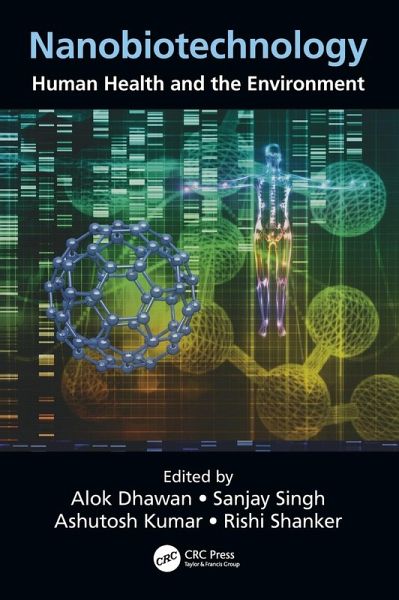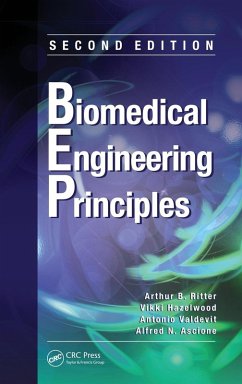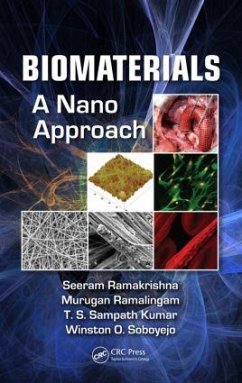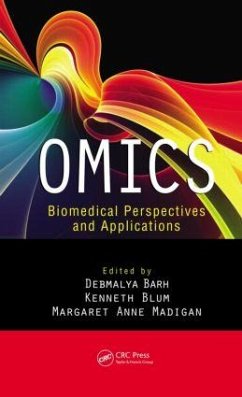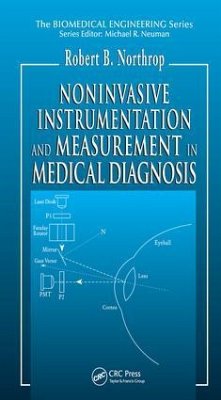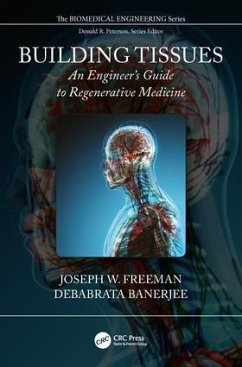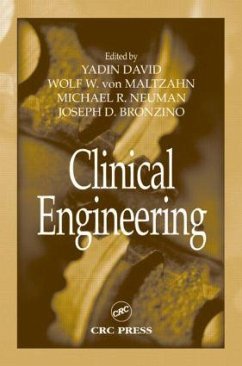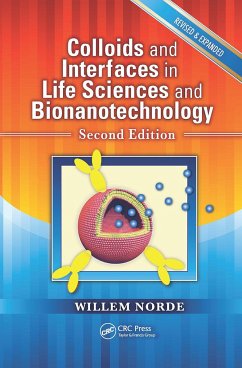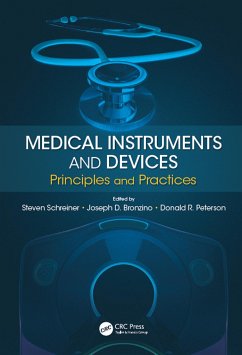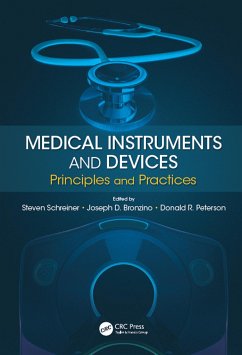Gebundenes Buch
Nanobiotechnology
Human Health and the Environment
Herausgeber: Dhawan, Alok; Kumar, Ashutosh; Singh, Sanjay
Versandkostenfrei!
Versandfertig in 1-2 Wochen
Weitere Ausgaben:

PAYBACK Punkte
155 °P sammeln!




The book presents a strong overview of most of the critical areas in the rapidly developing field of nanobiotechnology from materials science, molecular biology, toxicology, bio-organic and bio-inorganic chemistry.
Professor Alok Dhawan is currently Director, CSIR-Indian Institute of Toxicology Research, Lucknow. He also served as Founding Director, Institute of Life Sciences, and Dean, Planning and Development, Ahmedabad University, Gujarat. Before joining as Director, CSIR-IITR, he also worked on different scientific positions, like - Scientist, C, Senior Principal Scientist, Principal Scientist, etc. He obtained his Ph.D. Degree in Biochemistry from University of Lucknow, India in 1991. He has been awarded D.Sc. Degree (Honorary) from University of Bradford, U.K., 2017. He was a Visiting Scholar, Michigan State University, USA; BOYSCAST Fellow, University of Surrey, Wales & Bradford, UK. Professor Dhawan started the area of nanomaterial toxicology in India and published a guidance document on the safe use of nanomaterials. His group elucidated the mechanism of toxicity of metal oxide nanoparticles in human and bacterial cells. His work has been widely cited. He set up a state-of-the-art nanomaterial toxicology facility at CSIR-IITR as well as at the Institute of Life Sciences. Professor Dhawan has won several honors and awards including the INSA Young Scientist Medal in 1994, CSIR Young Scientist Award in 1999, the Shakuntala Amir Chand Prize of ICMR in 2002 and the Vigyan Ratna by the Council of Science and Technology, UP in 2011. His work in the area of nanomaterial toxicology has won him international accolades as well and he was awarded two Indo-UK projects under the prestigious UK-IERI programme. He was also awarded two European Union Projects under the FP7 and New INDIGO programmes. He founded the Indian Nanoscience Society in 2007. In recognition of his work he has been elected Fellow, Royal Society of Chemistry, UK; Fellow, The National Academy of Sciences, India; Fellow, The Academy of Toxicological Sciences, USA; Fellow, The Academy of Environmental Biology; Fellow, Academy of Science for Animal Welfare; Fellow-Society of Toxicology (India); Founder Fellow, Indian Nanoscience Society; Fellow, Gujarat Science Academy; Vice President-Environmental Mutagen Society of India (2006-07); Member-National Academy of Medical Sciences; Member, United Kingdom Environmental Mutagen Society, U.K.; Member, Asian Association of Environmental Mutagen Societies, Japan. He has over 125 publications to his credit in peer reviewed international journals, 18 reviews/book chapters, four patents, two copyrights and has edited two books. He is the Editor-In-Chief, Journal Translational Toxicology published by American Scientific Publishers, USA and serves as the Member, Editorial Board of Mutagenesis, Nanotoxicology, Mutation Research Reviews, and other journals of repute. Professor Rishi Shanker, currently serves as Guest Faculty at Biotechnology Park, Lucknow, India and as consultant to biotechnology industry. He has served as Professor & Associate Dean at the School of Arts & Sciences, Ahmedabad University, Gujarat, India (2014-16). Prior to joining Ahmedabad University, he served as Chief Scientist and Area Coordinator - Environmental & Nanomaterial Toxicology Groups at CSIR-Indian Institute of Toxicology Research, Lucknow (2001-2013). He also served as Principal Scientist at CSIR-National Environmental Engineering Research Institute, Nagpur. A Masters in Biochemistry from University of Lucknow and a PhD in Environmental Microbiology & Toxicology from CSIR-IITR & CSJM University (1985). Dr Shankers' post-doctoral research addressed methanogen microbiology, deep subsurface microbiology and protein engineering at University of London and Pennsylvania State University, USA (1987-1990). Dr Shanker's research contributions range from genetically engineered bacteria for bioremediation and molecular probes for pathogen detection to alternate models in toxicity assessment of chemicals and engineered nanomaterials. He has successfully steered over 34 national and international research projects including Indo-US program: Common Agenda for Environment, Indo-Swiss Program in Biotechnology, Indo-German, EU FP7, EU New Indigo & Inno Indigo program and Unilever. He has mentored 11 PhD students and has more than 85 publications and 20 reviews/book chapters to his credit in aforesaid areas. His work on 'pathogen detection and water quality' received recognition in form of 'Vigyan Ratna', conferred by the Government of Uttar Pradesh, India. He was awarded the Visiting Research Fellowship of Society for General Microbiology, UK to work at the Anaerobic Microbiology Laboratory, Queen Mary College, University of London. He has served as Visiting Scientist and Visiting Professor at the University of Washington, Seattle, USA; Pasteur Institute & CEA, France; and Pohang University of Science & Technology, Republic of Korea. Dr Ashutosh Kumar is presently working as Assistant Professor in the Division of Biological and Life Sciences, School Arts and Sciences, Ahmedabad University, Gujarat, India. He obtained his Master's degree in Applied Microbiology from Vellore Institute of Technology, Vellore in 2008 and worked at CSIR-Indian Institute of Toxicology Research, Lucknow for his Doctorate degree in Biotechnology. Dr Kumar's research group works majorly in the area of nanomedicines for cancer and arthritis, nano based drug and gene delivery, DNA biochip for the detection of pathogens, nanoemulsions for food application, environmental nanotechnology, nanotoxicology and genetic toxicology. Dr Kumar established several new methods for nanomaterial safety assessment in India. He developed a novel method for the detection of uptake of nanoparticles in live bacteria for several generations. His work was focused in deciphering the mechanism of metal oxide nanoparticles induced genotoxicity and apoptosis in the prokaryotic, eukaryotic as well as in in vivo model. In the area of environmental biology, he was involved in understanding fate, impact and biomagnification of nanomaterials in aquatic ecosystem using the paramecium, daphnia and zebra fish as a model organism. The work conducted by him is in the frontiers of nanomaterial safety area worldwide. His studies shall have far reaching applications in predicting the adverse health effects of nanoparticles and safe use of nanomaterials to protect human and environmental health. He has published more than 40 research papers and 12 book chapters in internationally reputed peer reviewed journals. He has received several national and international awards including the "INSA Medal for Young Scientist 2014", NASI-Young Scientist Platinum Jubilee Award (2015) in the area of Health Sciences for his scientific contributions. Dr Sanjay Singh is an Associate Professor at the Division of Biological & Life Sciences, Ahmedabad University, India. He obtained his MSc degree from University of Allahabad (2004), and PhD degree from CSIR-National Chemical Laboratory India (2008). Prior to joining Ahmedabad University as Assistant Professor (2012), he worked as postdoctoral research fellow (2008 - 2012) at University of Central Florida (Orlando, USA) and Pennsylvania State University (Hershey, USA). Dr Singh's research area includes the synthesis of catalytic nanomaterials exhibiting biological enzyme-like properties (Nanozymes), which are exploited for the development of biosensors and detection of cancer cells. His research group works to develop novel nanoprobes for imaging of cancerous cells using chemiluminescence, absorbance and photoluminescence approaches that would yield improved diagnoses and greater information about the underlying pathophysiology of human diseases. He also works to develop nanoliposomes encapsulating multiple pharmacological agents for targeted damage to cancer cells. Dr Singh has received several honors and awards such as Endeavour Research Fellowship by Government of Australia (2015), Research Excellence Award by Ahmedabad University, India (2016), Yamagiwa-Yoshida (YY) Memorial award by Union of International Cancer Control (2016), and International Association of Advanced Materials Scientist Medal (2017). He has served as visiting professor at RMIT University, Australia and University of Pennsylvania, USA. Dr Singh has authored more than 50 papers in international journals and 4 book chapters published in the field of nanoscience and nanotechnology. He is serving as an Associate Editor for the journal "3Biotech", published by Springer; Editorial Board Member of "American Journal of Nanoscience and Nanotechnology", and "International Journal of Medical Sciences". Dr Singh also serves as consulting editor for "Research and Reports in Transdermal Drug Delivery" published by Dove Press.
Produktdetails
- Verlag: CRC Press
- Seitenzahl: 512
- Erscheinungstermin: 2. April 2018
- Englisch
- Abmessung: 260mm x 183mm x 32mm
- Gewicht: 1148g
- ISBN-13: 9781498721424
- ISBN-10: 1498721427
- Artikelnr.: 52494793
Herstellerkennzeichnung
Libri GmbH
Europaallee 1
36244 Bad Hersfeld
gpsr@libri.de
Für dieses Produkt wurde noch keine Bewertung abgegeben. Wir würden uns sehr freuen, wenn du die erste Bewertung schreibst!
Eine Bewertung schreiben
Eine Bewertung schreiben
Andere Kunden interessierten sich für



